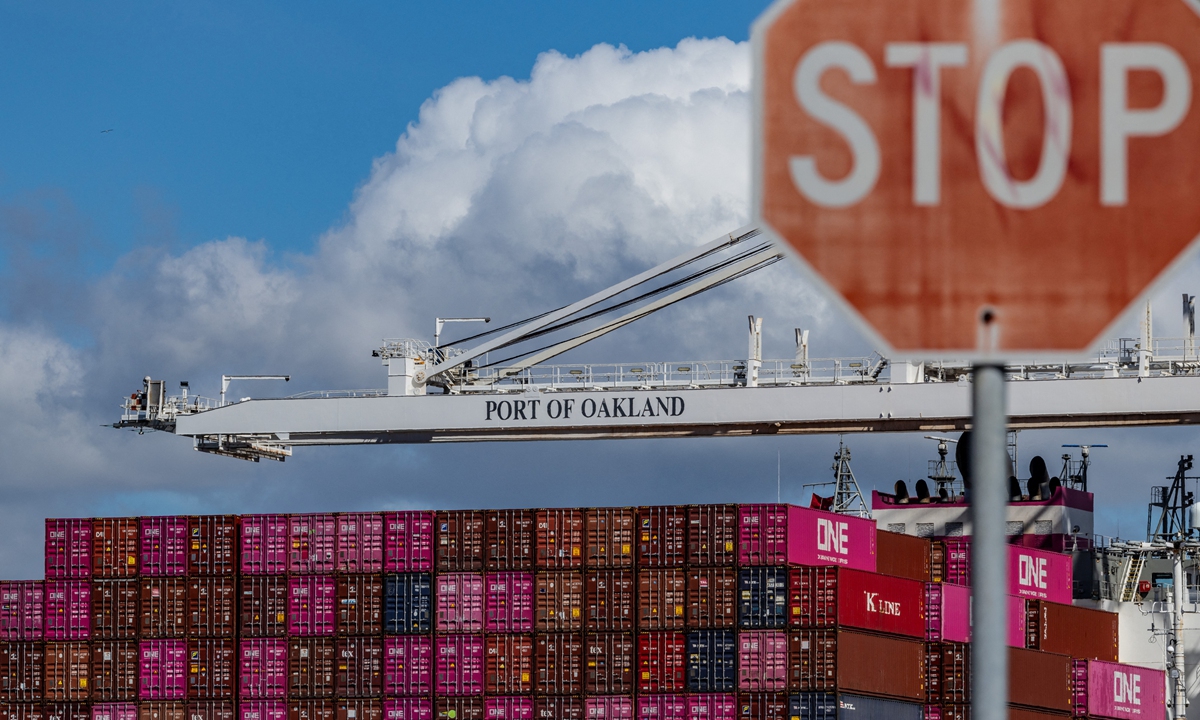
A cargo ship full of shipping containers is seen at the port of Oakland as trade tensions escalate over US tariffs, in Oakland, California, US, on March 6, 2025. Photo: IC
In response to a question about the repeated changes in US tariff policies, Chinese Foreign Ministry spokesperson Lin Jian stated on Monday at a press conference that the facts have shown, and will continue to show that there are no winners in a tariff or trade war, and protectionism leads nowhere, adding that the US' excessive use of tariffs harms both others and itself.
Lin noted that the Ministry of Commerce's spokesperson has already made clear China's position on the matter.
We urge the US to abandon its wrong approach of using extreme pressure and resolve issues through dialogue based on equality, respect, and reciprocity, said Lin.
US President Donald Trump pledged he will still apply tariffs to phones, computers and popular consumer electronics, the Bloomberg reported.
"NOBODY is getting 'off the hook'," Trump said in a social media post Sunday. The exempted products are "just moving to a different Tariff 'bucket'" and the administration will be "taking a look at Semiconductors and the WHOLE ELECTRONICS SUPPLY CHAIN," he added, according to the Bloomberg.
Trump told reporters aboard Air Force One that his decisions will come soon, indicating that details on a tariff rate for semiconductors would be announced in the coming week, according to Bloomberg.
The remarks came after the US Customs and Border Protection announced in an updated guidance late Friday that the government has exempted smartphones, computers and other electronic products from its "reciprocal tariffs."
The document stated that the exemption applies to electronic products entering the US after April 5, and "reciprocal tariffs" already paid can be refunded upon request, Xinhua reported.
Zhou Mi, a senior research fellow at the Chinese Academy of International Trade and Economic Cooperation, told the Global Times on Monday that the chaotic messages in tariff policies make it difficult for markets to assess the policy direction. "It's unclear what criteria are being followed, creating significant uncertainty and confusion," Zhou said.
Given the high level of international integration in the electronics industry, imposing tariffs will make it harder for the US to source related products from abroad. Higher import costs will also significantly raise expenses for downstream assembly and manufacturing companies in the US, Zhou added.
He Weiwen, a senior fellow at the Center for China and Globalization, told the Global Times on Monday that the erratic nature of the US tariff policy has severely damaged its international credibility.
"The self-contradictory US tariff policy also reveals that its so-called 'reciprocal tariffs' have encountered numerous specific problems at the supply-chain level during its actual implementation, and these issues cannot be independently resolved by the US itself," He said.
There may be many more reversals in US tariff policies in the future, but the general direction is that they are doomed to failure, He added.
In terms of the semiconductor-related tariff policy, He said that there will not be an obvious impact on China's chip industry as the US is not a main export destination for Chinese chips.
In 2024, the export value of integrated circuits reached $159.55 billion, a year-on-year increase of 17.4 percent, a record high. South Korea, Vietnam, Malaysia and India were among the main export markets for China's integrated circuits, according to the official WeChat of China Chamber of Commerce for Import and Export of Machinery and Electronic Products.
As for the relevant industries in the US itself, imposing tariffs on electronic products and chips will have a huge impact on US technology companies. Chip processing and manufacturing links are complex and rely on cross-border cooperation. Tariffs will disrupt the supply chain and hinder US competitiveness, He said.
The latest twist has prompted further confusion for the tech sector. Some tech industry insiders argued that contradictory comments from the administration were hurting American companies, the Washington Post reported.
"The chaotically mixed messages are terrible for the market and the economy. Apocalyptically so. Maximum uncertainty," Gavin Baker, managing partner and chief investment officer at Atreides Management, posted on X, according to the Washington Post.
"The mass confusion created by this constant news flow out of the White House is dizzying for the industry and investors and creating massive uncertainty and chaos for companies trying to plan their supply chain, inventory, and demand," Dan Ives, a senior analyst for Wedbush, wrote in a note to investors, according to the Washington Post.
The Financial Times reported that the latest messages will spark further uncertainty on Wall Street on Monday about the impact of the president's tariff rollout, which has been marked by a series of reversals that have caused a share price rollercoaster and a sell-off last week in the $29tn US Treasuries market.
Ray Dalio, the billionaire founder of hedge fund Bridgewater Associates, warned US' tariffs were "very disruptive". "I think that right now we are at a decision-making point and very close to a recession," said Dalio, speaking on NBC. "And I'm worried about something worse than a recession if this isn't handled well."
Chinese Ministry of Commerce (MOFCOM) said on Sunday that the implementation of so-called "reciprocal tariffs" through an administrative order not only contravenes fundamental economic and market principles but also disregards the complementary cooperation and supply-demand relationships between nations.
Since the introduction of "reciprocal tariffs" on April 2, it has not only failed to resolve any issues for the US but has also severely disrupted the international trade order, significantly interfering with normal business operations and people's consumption, ultimately harming others without benefiting itself, a spokesperson of the MOFCOM said.
The spokesperson urges the US to face up to the rational voices of the international community and domestic parties, take a big step in correcting its mistakes, completely cancel the wrong practice of "reciprocal tariffs," and return to the right path of mutual respect and resolving differences through equal dialogue.




